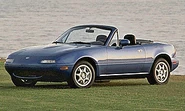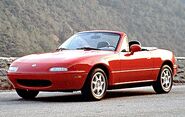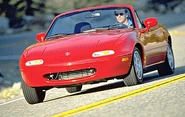No edit summary Tag: rte-wysiwyg |
No edit summary Tag: rte-wysiwyg |
||
| Line 3: | Line 3: | ||
|image=[[File:96mazdamx5miata.jpg]] |
|image=[[File:96mazdamx5miata.jpg]] |
||
|classification=Compact car |
|classification=Compact car |
||
| − | |bodystyle=2DR |
+ | |bodystyle=2DR Convertible |
|transmission=5-speed manual<br>4-speed automatic |
|transmission=5-speed manual<br>4-speed automatic |
||
|wheelbase=89.2 (until 2005) |
|wheelbase=89.2 (until 2005) |
||
| Line 14: | Line 14: | ||
The Miata was originally going to be marketed as an "entry-level, sub-$10,000, pure sports car." It hit the market at nearly $14,000 when Mazda realized it had a winner, and the pricing hasn't been shy since. Along with the elevated price came an elevated buyer less in love with the Spartan roadster that the fathers of the Miata had envisioned. In line with that, an automatic transmission was added, power equipment and a/c were packaged differently, leather was made very special and desirable, colors were added in limited-edition special packages, and the image was reinforced through an aggressive Sports Car Club of America racing program that saw the Miata completely dominate its class (until Chrysler's similar program to race the Neon began to pay off). |
The Miata was originally going to be marketed as an "entry-level, sub-$10,000, pure sports car." It hit the market at nearly $14,000 when Mazda realized it had a winner, and the pricing hasn't been shy since. Along with the elevated price came an elevated buyer less in love with the Spartan roadster that the fathers of the Miata had envisioned. In line with that, an automatic transmission was added, power equipment and a/c were packaged differently, leather was made very special and desirable, colors were added in limited-edition special packages, and the image was reinforced through an aggressive Sports Car Club of America racing program that saw the Miata completely dominate its class (until Chrysler's similar program to race the Neon began to pay off). |
||
==Year-to-year changes== |
==Year-to-year changes== |
||
| + | ===1991=== |
||
| + | Optional antilock brakes were added to the Miata for 1991. The car remained a carryover for the 1992 and 1993 model years. |
||
===1994=== |
===1994=== |
||
For this model year, there were dual airbags, side-impact reinforcement, chassis bracing, larger brakes, heavier driveshafts and differential and a larger gas tank raised weight (slightly offset by optional lighter alloy wheels). The optional limited-slip differential was changed from a viscous type to the Torsen type. The engine was enlarged from 1.6 liters to 1.8, horsepower went from 116 to 128, and torque was up by 10%. |
For this model year, there were dual airbags, side-impact reinforcement, chassis bracing, larger brakes, heavier driveshafts and differential and a larger gas tank raised weight (slightly offset by optional lighter alloy wheels). The optional limited-slip differential was changed from a viscous type to the Torsen type. The engine was enlarged from 1.6 liters to 1.8, horsepower went from 116 to 128, and torque was up by 10%. |
||
===1995=== |
===1995=== |
||
For 1995, Montego Blue paint has been added, and equipment packages have been revised. The new Popular Equipment Group combines alloy wheels, power steering, leather-wrapped steering wheel, power mirrors, headrest speakers, limited-slip differential, power windows, cruise control and power antenna. The leather seat package includes all of the above plus a tan vinyl top. ABS and a premium sound system are options. |
For 1995, Montego Blue paint has been added, and equipment packages have been revised. The new Popular Equipment Group combines alloy wheels, power steering, leather-wrapped steering wheel, power mirrors, headrest speakers, limited-slip differential, power windows, cruise control and power antenna. The leather seat package includes all of the above plus a tan vinyl top. ABS and a premium sound system are options. |
||
| + | ===1996=== |
||
| + | The 1996.5 model of the M-Edition trim level was introduced in February 1996. The new M-Edition contained 133 horsepower, and had the same 1.8-liter, 4-cylinder engine as the base model. The M-Edition remained in the market through the 1997 model year, while the base model lasted through early 1998. |
||
| + | ===1999=== |
||
| + | The second generation Mazda Miata convertible was released as an early 1999 model in February 1998. |
||
==Retail prices== |
==Retail prices== |
||
As of April 1, 1994: |
As of April 1, 1994: |
||
| Line 42: | Line 48: | ||
</gallery> |
</gallery> |
||
| + | {{Template:List of cars}} |
||
[[Category:Mazda]] |
[[Category:Mazda]] |
||
[[Category:1989 introductions]] |
[[Category:1989 introductions]] |
||
[[Category:Discontinued in 2005]] |
[[Category:Discontinued in 2005]] |
||
| − | [[Category:Compact |
+ | [[Category:Compact vehicles]] |
| + | [[Category:2-door convertibles]] |
||
[[Category:5-speed manual vehicles]] |
[[Category:5-speed manual vehicles]] |
||
[[Category:4-speed automatic vehicles]] |
[[Category:4-speed automatic vehicles]] |
||
Revision as of 10:32, 15 January 2017
The Miata was originally going to be marketed as an "entry-level, sub-$10,000, pure sports car." It hit the market at nearly $14,000 when Mazda realized it had a winner, and the pricing hasn't been shy since. Along with the elevated price came an elevated buyer less in love with the Spartan roadster that the fathers of the Miata had envisioned. In line with that, an automatic transmission was added, power equipment and a/c were packaged differently, leather was made very special and desirable, colors were added in limited-edition special packages, and the image was reinforced through an aggressive Sports Car Club of America racing program that saw the Miata completely dominate its class (until Chrysler's similar program to race the Neon began to pay off).
Year-to-year changes
1991
Optional antilock brakes were added to the Miata for 1991. The car remained a carryover for the 1992 and 1993 model years.
1994
For this model year, there were dual airbags, side-impact reinforcement, chassis bracing, larger brakes, heavier driveshafts and differential and a larger gas tank raised weight (slightly offset by optional lighter alloy wheels). The optional limited-slip differential was changed from a viscous type to the Torsen type. The engine was enlarged from 1.6 liters to 1.8, horsepower went from 116 to 128, and torque was up by 10%.
1995
For 1995, Montego Blue paint has been added, and equipment packages have been revised. The new Popular Equipment Group combines alloy wheels, power steering, leather-wrapped steering wheel, power mirrors, headrest speakers, limited-slip differential, power windows, cruise control and power antenna. The leather seat package includes all of the above plus a tan vinyl top. ABS and a premium sound system are options.
1996
The 1996.5 model of the M-Edition trim level was introduced in February 1996. The new M-Edition contained 133 horsepower, and had the same 1.8-liter, 4-cylinder engine as the base model. The M-Edition remained in the market through the 1997 model year, while the base model lasted through early 1998.
1999
The second generation Mazda Miata convertible was released as an early 1999 model in February 1998.
Retail prices
As of April 1, 1994:
- $17,000 (1994 Mazda MX-5 Miata)
As of September 1, 1994:
- $17,500 (1995 Mazda MX-5 Miata)
As of June 30, 1995:
- $17,895 (1995 Mazda MX-5 Miata)
- $23,530 (1995 Mazda MX-5 Miata M-Edition)
As of October 2, 1995:
- $18,450 (1996 Mazda MX-5 Miata)
Shipping prices
- $425 (1994 models)
- $440 (early 1995 models)
- $450 (1995 models)
Gallery


